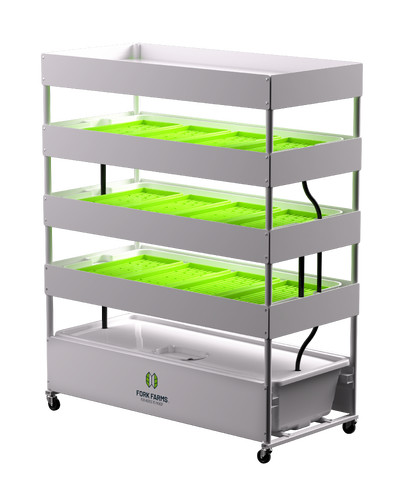Farm to School Program at Holmen School District is Growing Year-Round
Farm to school enriches the connection communities have with fresh, healthy food by encouraging early education practices at schools focused on nutrition, growing food, and the power of buying locally grown foods. One such school is the School District of Holmen in Wisconsin.
Many school food service programs have robust soil gardens, which depending on geographic location can only be used for part of the year. An indoor hydroponic farm, like a Flex Farm, provides a perfect complement to extend the growing season, especially in cooler climates.
Practicing Farm to School Since 2009
Holmen has been practicing Farm to School education since 2009 and has been involving students every step of the way. The district, with classroom applications, manages and feeds the kids food from their 85-tree apple orchard, large outdoor garden, indoor greenhouse, and most recently their Flex Farms.
Flex Farms are the most efficient and transformative indoor vertical hydroponic technology on the planet that can grow more than 20 pounds of produce every month. Flex Farms grow food faster, in less space with less water and electricity.
“It is all about exposing students at a young age about their food and where it comes from,” said Kristen Slade, the Holmen District’s Nutrition Team Leader. “It’s a wonderful thing for not only students but parents, to see their kids are eating fresh grown foods. It doesn’t get any more wholesome than that.”
Farm to School Program Expanded to Hydroponics
The district recently expanded its program with an indoor hydroponic farm to produce salad greens and other crops for school lunches. Best of all, some of the Flex Farms are being managed by high schoolers in the agriculture program. These students will now round out their farming education with hydroponics, expanding their skill sets and broadening their appreciation for different farming methods. In Holmen, the students learn with hands-on activities, including greenhouse and orchard management where they care for a variety of plants and food.
The staff has also noticed students are more willing to try new foods if they had helped grow or prepare it themselves. In addition to growing a lot of food, the district sources local farms they can buy food from to serve during school mealtimes. “It’s so encouraging, as our students know what it takes to put a meal on the table, they appreciate all the steps from seed to salad,” Slade said.
Their 2023 graduating class is the second to have been educated from kindergarten to their senior year with Farm to School practices.
Farm to School Grant Webinar
Are you interested in starting or expanding your school’s Farm-to-School program? The Fork Farms Foundation, a 5013-c working to end hunger by making fresh food accessible to all, is here to help.
Join us for a free webinar on December 5 called, “How to Craft Your Farm to School Grant for Flex Farms.” The Foundation team will lead you through all the steps to apply for USDA grants to expand programs like this throughout the country. For more information and to register visit this link.
Author: Alyssa Scriven, Executive Support Leader Fork Farms
Published: 2022
Important Links:
























